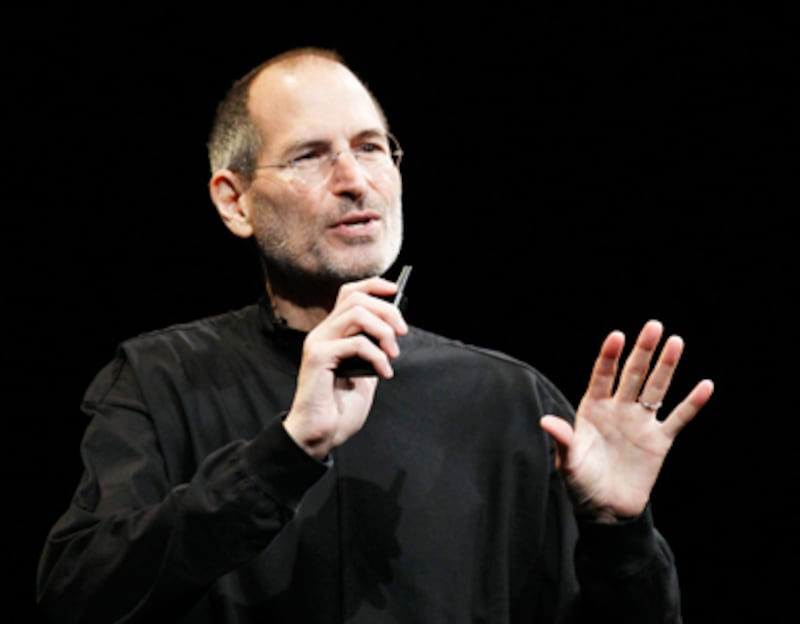As Apple announces blowout earnings, its secretive CEO is once again demanding privacy to deal with his illness. Do shareholders deserve full disclosure? Casey Schwartz asks business experts. Plus, Dan Lyons and Brian Ries on Apple's record earnings.
Once again, Steve Jobs has us reading tea leaves, trying to squeeze out every last implication from the terse memo he sent out over the weekend to Apple employees, announcing that he is taking another leave of absence from the company. Jobs offered no explanation, leaving outside observers—in other words, almost everyone—to puzzle over the possibilities.

So the innuendo brigade took off, extrapolating from what is known—his diagnosis of a rare form of pancreatic cancer in 2004, his liver transplant in 2009, his dramatic weight loss in recent months—to what isn’t. Is his cancer back? ABC News wondered. Has it spread? Could it be the aggressive actions of the immune system suppressing drugs given to transplant patients to help prevent rejection of their new organs? The New York Times asked.
On this very website, Newsweek writer Dan Lyons, otherwise known as the fake Steve Jobs, stepped into the fray, announcing preemptively that attempts to probe Jobs’ health would be in bad taste and that he, for one, would abstain.
Meanwhile, Ben Heineman at The Atlantic treated the issue as a no-brainer, declaring that full disclosure of Jobs’ current medical condition should be required by the SEC.
It’s not the first time that Steve Jobs has inspired philosophizing about his right to privacy. The question is wedged into the intersection of medicine and industry. And the answer is: It depends who you’re talking to.
For Arthur Caplan, a professor of bioethics at the University of Pennsylvania, “The ethics are clear: he has no obligation to say anything.” Calls for Jobs to disclose his medical status are “built on greed and profit and self-interest,” not on the well-being of Jobs, Caplan argues. Those who say the Apple CEO has an ethical obligation to reveal his medical status are looking at it from a business point of view; “from a pocketbook point of view.”
Now, Jobs’ troubled health is an established fact, well-known to investors; the market is not so easily spooked and the value of Apple’s stock not so easily affected by new medical disclosures.
The important issue in all of this, for Caplan, is the principle that medical privacy is an inviolable right, no matter who the patient. The core issue of privacy transcends the interests of Apple shareholders (and, full disclosure: I am one of them). “The notion of medical privacy is core to making sure that people will seek medical care...Without privacy, medicine falls apart,” Caplan says. “Medical ethics trump business ethics.”
This sentiment is not a given in the business world, however. Charles Elson, director of the John L. Weinberg Center for Corporate Governance at the University of Delaware, says, “That’s the trade-off: You have the advantage of going public, but people want to know how you’re doing—and you have to cede to the demands. That’s why we have a system based on disclosure. Otherwise people wouldn’t invest.”
We’ve been down this road with Apple before. Concerns started to swirl in 2008 over Jobs’ appearance—suddenly gaunt—and his absence from board meetings and other gatherings where he was expected. Jobs and Apple did not clarify what was going on; he took a leave of absence in 2009 without explanation. It was The Wall Street Journal that explained, in an article in June 2009, that Jobs had taken the leave to get a liver transplant at a hospital in Tennessee.
Jobs is notorious for his secrecy—and that extends beyond the issue of his health. Last year, when an Apple engineer accidentally left a new-generation 4G iPhone at a bar—before it had been released—Jobs and Apple responded as if to a breach of homeland security, sending a veritable swat team to the home of the reporter who bought the phone and published its details, Gizmodo Jason Chen.
Jeffrey Sonnenfeld, dean of the Yale School of Management, says Apple, while being far from transparent, is behaving more above-board now than the last time around.
“Legally, I think that this round the board has complied with minimal good governance requirements. In terms of responsible standards, they still have a little ways to go,” he says.
Now, of course, Jobs’ troubled health is an established fact, well-known to investors; the market is not so easily spooked and the value of Apple’s stock not so easily affected by new medical disclosures.
“It’s a pretty remarkable tour of duty. He’s an incredible, unrivaled, entrepreneurial genius, but still, the board is in danger of falling victim to the entrepreneurial aura of the founder,” Sonnenfeld says. “...Countless other technology entrepreneurs often create an almost monarchic vision of themselves where they don’t want to talk about succession. They think the discussion is premature until they’re gone.”
Casey Schwartz is a graduate of Brown University and has a Masters Degree in psychodynamic neuroscience from University College London. She has previously written for The New York Sun and ABC News. Currently, she's working on a book about the brain world.






